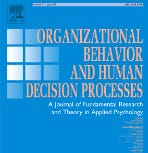New article in OBHDP (February 5th, 2025)
“You knew what you were getting into”: Perspective differences in gauging informed consent
https://www.sciencedirect.com/science/article/abs/pii/S0749597824000785
Rachel Schlund, Vanessa K. Bohns
In our personal and work lives, we are often required to grant consent to an organization, such as consenting to sharing medical records or granting an employer access to company-provided devices. At times, however, we might grant consent without truly feeling that we are informed about the extent of that consent. A notable example occurred in the early 2000s when Verizon New England required employees to use company-issued phones equipped with GPS tracking, allowing the company to monitor their location both on and off company property. Although employees formally consented to these terms, they later questioned whether they truly understood the extent of the surveillance. This paper explores the disconnect between those who solicit consent (e.g., employers) and those who provide it (e.g., employees). The authors theorize that people soliciting consent systematically overestimate how informed the consenting party truly feels. Although this discrepancy may not affect the legality of the consent, it can create misaligned expectations between organizations and employees. The results of four studies indicate that solicitors of extent systematically overestimate consenters’ subjective experience of consent. This divergence can have detrimental consequences for organizations (e.g., higher turnover intentions). These findings indicate that organizations should ensure that employees feel as if they truly understand what they are consenting to and have genuinely consented.
P.S. if you can’t access the full-text let us (m-kouchaki@kellogg.northwestern.edu or mikebaer@asu.edu) know and we’d be happy to share a copy.


